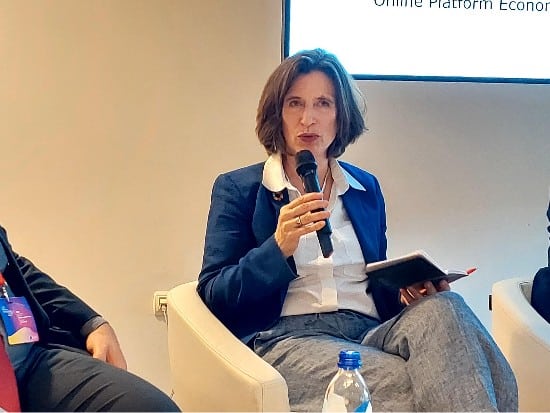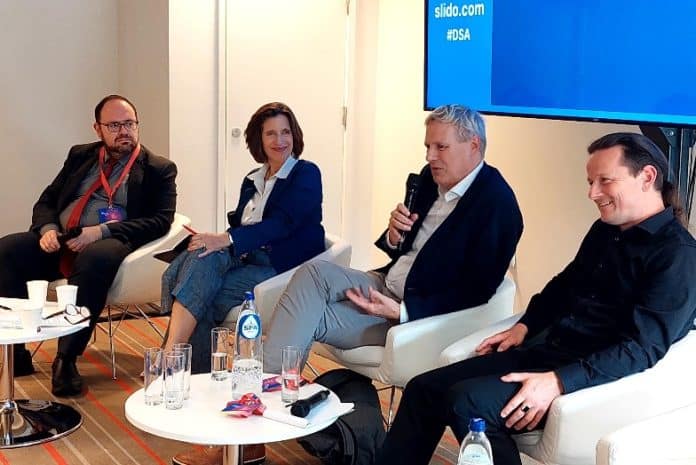Today, the European Union (EU) and the United Nations (UN) came together to discuss how new EU social media rules can foster a safer and more open digital environment within the EU and beyond, during the Digital Services Act stakeholder event.
Panellists and audience explored what the latest developments in the EU’s Digital Services Act mean for other jurisdictions in the rest of the world at a panel discussion moderated by UN Under-Secretary-General for Global Communications Melissa Fleming.
“At the UN we are really encouraged to see the EU looking beyond Europe on this issue,” Ms. Fleming said at the opening of the workshop’s discussion. “The reverberations are already being felt worldwide – even before they come into force. We can reasonably expect this Act to set a new de facto global regulatory benchmark.”

Digital platforms have brought many benefits, supporting communities in times of crises, elevating marginalised voices and helping to mobilise global movements for racial justice and gender equality.
Yet these same digital platforms are being misused to subvert science and spread disinformation and hate to billions of people, fuelling conflict, threatening democracy and human rights, and undermining public health and climate action.
According to UN Secretary General António Guterres “the ability to disseminate large-scale disinformation to undermine scientifically established facts poses an existential risk to humanity.”
Concerted international response
During the panel discussion, Fleming referred to the UN chief’s policy brief on information integrity on digital platforms, launched earlier this month.
This brief puts forward the framework for a concerted international response to the proliferation of hate and lies in the digital space through a Code of Conduct.
Aimed at governments, tech companies, digital platforms, advertisers and other stakeholders, the policy brief includes proposals to make the digital space safer and more inclusive, while vigorously protecting human rights.
Code of conduct
The policy brief will inform a Code of Conduct for information integrity on digital platforms that the UN is developing ahead of next year’s Summit of the Future.
This Code of Conduct will be a robust response for a more humane digital space. Like the EU’s Digital Services Act, the UN’s approach seeks meaningful changes from the platforms, including a commitment to move away from damaging business models that prioritise engagement above human rights, privacy, and safety.
The Code of Conduct will be based on global research and underpinned by a rigorous methodology for which the UN is engaging the academic community. It will include country and regional best practices as well as future proof solutions to current and forthcoming issues such as artificial intelligence.
“The Code of Conduct being developed now will take into consideration the situation for every country around the world. We will not have the ability to sanction the companies, but we do believe we have quite a lot of moral authority,” Fleming mentioned during her moderation.
Ripple effects
Panellists at today’s event agreed on the need to address the issue jointly and globally from as many points of view as possible. It is a balancing act to protect human rights and access to information while ensuring everyone is kept safe from the dangerous effects of disinformation.
“Our path forward must be human rights-based, multi-stakeholder, and multi-dimensional,” Fleming said at the start of the workshop on the Digital Services Act.
“We should all feel very positive about this monumental piece of legislation that could move the needle on how we are existing on social media platforms,” she concluded the workshop.
Today’s panel discussion was part of an entire day organized by the European Commission dedicated to workshops, networking opportunities and discussions on the topics covered by the Digital Services Act. It gathered around 1600 people in Brussels and online.
Speakers at the panel included Guilherme Canela De Souza Godoi, Chief, Freedom of Expression and Safety of Journalists Section, UNESCO; Helani Galpaya, CEO, LIRNEasia; Gerard de Graaf, Senior EU Envoy to the US, European Commission; and Jens Pruefer, Professor University of East Anglia and Observatory for the Online Platform Economy.
More information
- The Digital Services Act and the Digital Markets Act
- UN Backgrounder: Combat Misinformation – Selected Online Resources on Misinformation, Disinformation and Hate Speech
- The Secretary-General’s Press Briefing on Policy Brief on Information Integrity on Digital Platforms
- European Commissioner Thierry Breton
- The policy brief on information integrity on digital platforms is the latest in a series based on proposals contained in Our Common Agenda, the Secretary-General’s vision for future global cooperation.
- During COVID-19, the UN launched Verified, a campaign aiming to help people to cut through the disinformation on the pandemic. The campaign will be expanded to the topic of climate change.



